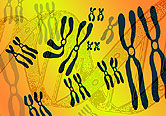
FRIDAY, Nov. 9 (HealthDay News) — In middle-aged people, a link may exist between weakened memory and genetic traits associated with obesity, raising the possibility that extra pounds change how our brains work, a new study suggests.
Researchers found the link between genes and memory in whites but not in blacks.
The research “could be useful in identifying people who may need more help with declining cognition,” said John Speakman, a professor at the Institute of Biological and Environmental Sciences at the University of Aberdeen in Scotland, who is familiar with the findings.
Although some people believe obesity is purely a failure of individual will, scientists think genetic makeup has a lot to do with the propensity to gain extra pounds. Studies of twins and families suggest that genes account for about 65 percent of variance in body weight, Speakman said.
The new study focuses on four genetic traits related to a gene that’s thought to play a role in obesity. Researchers looked for signs of the traits among nearly 8,400 white and 2,100 black people aged 45 to 64.
They found signs of a link between problems being able to remember words and two of the genetic traits. The connection held up even after the researchers adjusted their results so they wouldn’t be thrown off by factors like large or small numbers of people who were of certain ages, genders, levels of obesity and education levels.
What’s going on? It’s not clear. Speakman said it’s possible that the gene may affect both weight and memory.
“On the other hand, they could be linked because of negative impacts of obesity on memory function, or vice versa,” he said. “The data don’t allow us to see if that might be the case.”
Dr. Michael Schwartz, director of the Diabetes and Obesity Center of Excellence at the University of Washington, in Seattle, pointed out that the connection held up even when the researchers tried to remove any influence of weight levels.
“That suggests that it was present regardless of whether individuals were lean or obese,” said Schwartz, who is familiar with the study findings.
What about the apparent difference between blacks and whites in the research? Schwartz said limitations of the study may have prevented it from detecting similarities between the groups even though they exist.
In the big picture, he said, the research raises questions about these genetic variations and their effects on how the brain works. That can lead to future understanding of cause and effect and tell us how it all matters, he said.
The study, which appears online Nov. 7 in the journal Neurology, was supported by the U.S. National Institutes of Health. Although the study found an association among memory problems, genetic traits and obesity, it did not prove a cause-and-effect relationship.
More information
For more about obesity, try the U.S. National Library of Medicine.

